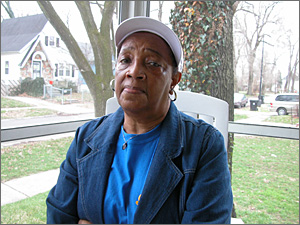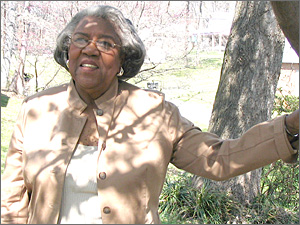|
Some people who were on the front lines of busing feel more was lost than gained when schools desegregated.
Benetha Ellis
 Benetha Ellis formed United Black Protective Parents during the busing crisis in Louisville, KY.
Photo by Kate Ellis Benetha Ellis sent three children through Louisville's public schools in the 1970s. Her kids were in grade school and junior high when the city started busing in 1975. At first, Ellis and her friends were optimistic about the change.
"We just thought our kids would get on the bus, and go to school and everything would be the same," she says.
Ellis quickly found this wasn't true.
"The kids started coming home and telling us what was going on, that all these people were standing outside taunting the buses and throwing things," Ellis says.
Ellis was working at a neighborhood center at the time and had the freedom to move around the city. When she realized that black parents were not going to get help from city or school officials to protect their children, Ellis got moving.
"We started having neighborhood meetings and telling stories about how the children were being treated," Ellis says. Eventually Ellis helped form an official group called United Black Protective Parents.
"We started going to the bus stops and going to the schools, and confronting the rioters and police, who were right in the middle of it," Ellis says. "We just started doing what we had to do to protect our children."
Ellis remembers the Ku Klux Klan standing along bus routes menacing black children. "When the kids boarded the bus," she says "there would be grown people standing at the bus, throwing things at the bus, calling the kids all kind of names. Our kids would be looking out the window, looking like trapped animals."
Ellis says the busing turmoil was terrifying. "We were like wild animals out there protecting our kids," she says. "If we had to burst into a classroom, that's what we did. If we had to burst into a principal's office, that's what we did. If we had to burst onto a bus, that's what we did."
When black children got off the bus and into school, Ellis says they faced more hostility. "Teachers treated them terribly," she says, "suspending our kids, and putting them in little 2' x 4' time-out rooms."
One time Ellis went down to her son's school, Pleasure Ridge Park High School, and ordered his teacher to stop disciplining her son. She told the principal that before he was bused her son was an A student. "He didn't get dumb overnight," she told him. Ellis continued, "Now you put scars on him, you pulled his arm, put fingernails on him. Now don't do it anymore. Do not touch them." After that, Ellis says, her son went back to school, did well and is now a vice president at Coca Cola.
Ellis says all her children made it through the busing crisis and are thriving as adults. But she knows other black people who became casualties of Louisville's school desegregation efforts.
"A lot of those kids that were bused with my children are now on these street corners and on drugs," Ellis says. "They are on drugs because they couldn't handle the mental abuse back then, and they didn't know how to handle what was going on. So they dropped out of school, and can't get a job."
Ellis says her own children did well in spite of school desegregation, not because of it. "So I don't see the benefits of it," she says. "I didn't see it then and I do not see it now."
Mae Clark Orr
 Mae Clark Orr spent her career teaching in Charlotte's public schools.
Photo by Kate Ellis When busing began, it wasn't only students who had to cross racial lines. Teachers were moved, too. Many black schools were closed, and the teachers and administrators were sent to white schools.
In the late 1960s, Mae Clark Orr was sent to a white school in a small town called Huntersville, NC to teach physical education.
"As we integrated that school, it's in a community where there were a lot of Klansmen, and they said they would die before integrating their school," she says. "So for the first year or two I carried a gun. I wasn't going to go down without protecting myself. But I never had to take it from my dashboard."
Like a lot of African American teachers and students, Orr couldn't help noticing how much nicer the materials and equipment were at the formerly white school. Before integration, many black schools had to get by with hand-me-down books and materials. Orr says she'd been at a high school with no gym and no cafeteria.
"We cooked hot dogs in the science lab every day," she says. "That was the lunch."
She says she taught at a black school that had only one record player. All twelve grades had to share it. At the white high school, "there was a record player in every classroom. They were saying 'separate but equal' - it was nowhere near equal. It wasn't. … They had overhead projectors. They had all kind of paper and things so you could mimeograph anything you wanted. We didn't have none of that."
Orr says she's glad schools integrated, so black students would have equal materials, but those first years of integration were hard. She says white teachers picked on black students and snubbed their new black colleagues.
She remembers when the faculty started planning a Christmas party.
"And they were getting all the white people to bring food. But they didn't ask any of us. It was four black females, one black male at that time. So we said we weren't going to the party. You know, if they couldn't eat my food, I definitely didn't want to eat theirs. Because I would be in the bathroom when they'd come in there, and they didn't wash their hands when they left. I said, 'What makes them think I want to eat their food?' So anyway, we did not go to the party. We were on our way out to our cars and they ran out, 'Where you all going?' We said, 'We're going home.' I told her, 'If you don't want to eat my food, I don't want to eat yours.' The next year they came around to see what we wanted to bring. That's the way we were treated."
Mae Clark Orr says she told another teacher he was being racist because he wouldn't excuse black children to go to the bathroom. She demanded to know why the white janitors were called Mr. Smith or Mr. Jones while the black janitors were called by their first names.
"I was very outspoken," she says. "When I left, they were so glad I left they gave me two departing gifts," she says with a laugh.
Many people who lived through those years say that eventually, things settled down and people made friends across racial lines. But Orr believes the changes are only on the surface.
"I wouldn't just say that everything has changed - that it's all good and we all look at each other without color - it's not that way," she says. "I know it isn't. And if people are saying that, they're fooling themselves. It's not there. If it's there in my lifetime, I'll be surprised."
More Voices from the Desegration Era
| 


